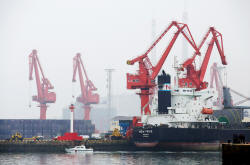U.S. discussing joint reserves release with China, others in aim at OPEC
 Send a link to a friend
Send a link to a friend
 [November 19, 2021] [November 19, 2021]
By Timothy Gardner and Muyu Xu
WASHINGTON/BEIJING (Reuters) - Governments
from some of the world's biggest economies said on Thursday they were
looking into releasing oil from their strategic reserves, following a
rare request from the United States for a coordinated move to cool
global energy prices and ahead of a meeting of major oil producing
countries.
The Biden administration has asked a wide range of countries, including
China for the first time, to consider releasing stocks of crude, the
White House said on Thursday.
Other major consumers India, Japan and South Korea were also involved in
discussions, several people familiar with the requests told Reuters on
Wednesday.
As the world economy rebounds from the pandemic, Washington is
frustrated that producers in OPEC+, the Organization of the Petroleum
Exporting Countries and allies such as Russia, have rebuffed U.S.
requests to speed up additional oil supplies.
With gasoline prices and other costs rising, Democratic U.S. President
Joe Biden also faces political pressure ahead of midterm congressional
elections next year. A Reuters poll in October showed 67% of U.S. adults
agreed that inflation is a very big concern.
Members of Biden's national security team had discussed the need to meet
fuel demand, White House spokesperson Jen Psaki said on Thursday.

"That is an ongoing conversation and one we are having with a number of
partners," Psaki added.
OPEC+ plans to meet on Dec. 2. The group has taken a slower approach to
boosting output, viewing the economic recovery as too fragile to justify
more supply.
Oil prices sank about 4% to a six-week low after Reuters reports about
the U.S. request and China's decision to release some crude, before
recovering some ground on Thursday. Oil prices have retreated from
recent highs in anticipation that world supply will rise. [O/R]
The announcement also cooled Asia's crude market, with physical spot
price premiums weakening for crudes sold to Asian buyers out of the
Middle East and Russia.
China's state reserve bureau told Reuters it was working on a release of
crude oil reserves, but declined to comment on the U.S. request.
China held its first ever public auction of oil reserves in September.
Consultancy Energy Aspects said in a note to clients that Beijing is
expected to release another 10 million to 15 million barrels of crude
from its reserves in eastern Zhoushan in its next auction round.
"Any oil released from the Chinese SPR needs to be refilled within 90
days," Energy Aspects said.
"The market should focus on where these countries will find crude to
refill these tanks given just how low stocks are."
The United States has the largest strategic reserve at more than 600
million barrels. The U.S. SPR
https://www.reuters.com/business/
energy/
what-is-spr-emergency-oil-stash-biden-may-tap-2021-11-18 was set up in
the 1970s after the Arab Oil Embargo to ensure the nation had adequate
supply to weather an emergency.
In the last several years, the shale boom has pushed U.S. output to
rival that of Saudi Arabia and Russia. That has enabled the United
States to become less dependent on energy imports from other nations,
particularly members of OPEC.
[to top of second column] |

A crude oil tanker is seen at Qingdao Port, Shandong province,
China, April 21, 2019. REUTERS/Jason Lee/File Photo

A CHALLENGE TO OPEC
The considerations highlight frustrations of importers such as the United States
and India with a cartel that has influenced oil prices for over five decades.
It would also mark the first time that China, the world's No. 2 oil consumer and
largest importer, would be involved in a coordinated release with the United
States.
There was no immediate official reaction from OPEC+ members. The group has been
raising output by 400,000 barrels per day (bpd) per month, gradually unwinding
record production cuts made in 2020 when the pandemic sank fuel demand.
This week, Secretary General Mohammad Barkindo said OPEC expects an oil supply
surplus to begin building next month. In September, exports from Saudi Arabia
rose to 6.52 million bpd, the highest since January.
One OPEC source who asked not to be identified said it would be surprising to
see consuming countries release stocks to lower prices rather than to meet a
supply shortage.
However, other countries have been pressing OPEC for some time, including China
and India.
"This is not a case of supplies not being available," Hardeep Singh Puri,
India's oil minister, told a conference in Dubai on Wednesday. "There are 5
million barrels a day of supplies available which have not been released for
whatever reason."
While OPEC+ has been raising oil output by 400,000 bpd per month since July, the
producer group still has about 3.8 million bpd in supply cuts that it has not
yet returned to the market. OPEC+ in April 2020 cut output by more than 10
million barrels a day in response to the swift spread of the coronavirus
pandemic. U.S. & Brent crude oil futures slip after U.S. govt requests that some
big oil buyers sell reserves,
https://fingfx.thomsonreuters.com/
gfx/ce/mopanloklva/
USvsBrentNov182021.png
CHINA IN, IEA OUT
The United States and its allies have coordinated strategic petroleum reserve
releases before, such as in 2011 when supplies were hit by a war in OPEC member
Libya. Coordination has been handled through the Paris-based energy watchdog the
International Energy Agency, whose membership includes the United States, Japan
and numerous European nations.
The United States, however, did not ask the European Union for its
participation, according to a source familiar with discussions, saying Europe's
primary problem has been related to higher natural gas prices.

The IEA, on its website, said such releases are not meant for price
intervention. Both Japan and South Korea were contacted by the United States,
and both said they do not release reserves simply to deal with rising prices.
U.S. crude oil in Strategic Petroleum Reserves,
https://fingfx.thomsonreuters.com/
gfx/ce/klpykdleepg/
USCrudeSPRNov2021.png
(Reporting by Tim Gardner in Washington, Yang Heekyong in Seoul, Aaron Sheldrick
and Yuka Obayashi in Tokyo, Chen Aizhu in Singapore, Nidhi Verma in Delhi,
Florence Tan in Singapore and Muyu Xu in Beijing, Ahmad Ghaddar in London,
Stephanie Kelly and Jessica Resnick Ault in New York, Swati Verma and Kavya
Guduru in Bengaluru, Alex Lawler in Abu Dhabi and Olesya Astakhova in Moscow;
Editing by David Gregorio, Matthew Lewis and Jonathan Oatis)
[© 2021 Thomson Reuters. All rights
reserved.] Copyright 2021 Reuters. All rights reserved. This material may not be published,
broadcast, rewritten or redistributed.
Thompson Reuters is solely responsible for this content. |